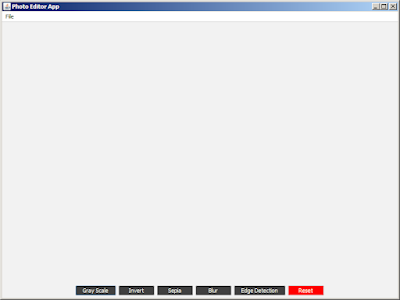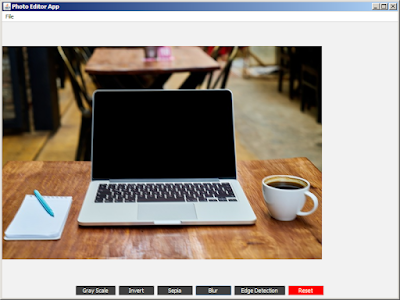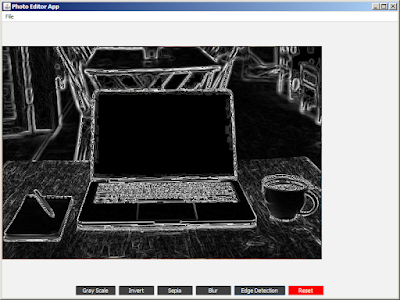How To Create a Photo Editor App In Java Using NetBeans
In this Java Tutorial we will see How to Create a Simple Photo Editor App Using Jframe JPanels, JLabels and JButtons In Java NetBeans.
This Java Application allows Users to select an image file and apply a range of filters such as grayscale, invert colors, sepia, blur, and edge detection, and save the edited image as a new one.
Project Source Code:
Create the PhotoEditorApp Class:
package photoeditorapp;
import java.awt.BorderLayout;
import java.awt.Color;
import java.awt.Graphics;
import java.awt.image.BufferedImage;
import java.awt.image.ColorModel;
import java.awt.image.WritableRaster;
import java.io.File;
import javax.imageio.ImageIO;
import javax.swing.ImageIcon;
import javax.swing.JButton;
import javax.swing.JFileChooser;
import javax.swing.JFrame;
import javax.swing.JLabel;
import javax.swing.JMenu;
import javax.swing.JMenuBar;
import javax.swing.JMenuItem;
import javax.swing.JOptionPane;
import javax.swing.JPanel;
import javax.swing.UIManager;
import javax.swing.filechooser.FileNameExtensionFilter;
/**
*
* @author 1BestCsharp
*/
public class PhotoEditorApp extends JFrame {
private BufferedImage originalImage;
private BufferedImage editedImage;
private JLabel imageLabel;
public PhotoEditorApp(){
setTitle("Photo Editor App");
setDefaultCloseOperation(JFrame.EXIT_ON_CLOSE);
setSize(800, 600);
setLocationRelativeTo(null);
createMenuBar();
imageLabel = new JLabel();
add(imageLabel, BorderLayout.CENTER);
JButton grayScaleButton = new JButton("Gray Scale");
grayScaleButton.setBackground(Color.darkGray);
grayScaleButton.setForeground(Color.white);
grayScaleButton.addActionListener(e -> applyGrayScaleFilter());
JButton invertButton = new JButton("Invert");
invertButton.setBackground(Color.darkGray);
invertButton.setForeground(Color.white);
invertButton.addActionListener(e -> applyInvertColorsFilter());
JButton sepiaButton = new JButton("Sepia");
sepiaButton.setBackground(Color.darkGray);
sepiaButton.setForeground(Color.white);
sepiaButton.addActionListener(e -> applySepiaFilter());
JButton blurButton = new JButton("Blur");
blurButton.setBackground(Color.darkGray);
blurButton.setForeground(Color.white);
blurButton.addActionListener(e -> applyBlurFilter());
JButton edgeDetectionButton = new JButton("Edge Detection");
edgeDetectionButton.setBackground(Color.darkGray);
edgeDetectionButton.setForeground(Color.white);
edgeDetectionButton.addActionListener(e -> applyEdgeDetectionFilter());
JButton resetButton = new JButton("Reset");
resetButton.setBackground(Color.red);
resetButton.setForeground(Color.white);
resetButton.addActionListener(e -> resetImage());
JPanel buttonPanel = new JPanel();
buttonPanel.add(grayScaleButton);
buttonPanel.add(invertButton);
buttonPanel.add(sepiaButton);
buttonPanel.add(blurButton);
buttonPanel.add(edgeDetectionButton);
buttonPanel.add(resetButton);
add(buttonPanel, BorderLayout.SOUTH);
setVisible(true);
}
private void createMenuBar(){
// Create a menu bar for the application
JMenuBar menuBar = new JMenuBar();
// Create a "File" menu
JMenu fileMenu = new JMenu("File");
// Create "Open" menu item and set an action listener to handle its click event
JMenuItem openItem = new JMenuItem("open");
openItem.addActionListener(e -> openImage());
// Create "Save" menu item and set an action listener to handle its click event
JMenuItem saveItem = new JMenuItem("save");
saveItem.addActionListener(e -> saveImage());
// Add "Open" and "Save" menu items to the "File" menu
fileMenu.add(openItem);
fileMenu.add(saveItem);
// Add the "File" menu to the menu bar
menuBar.add(fileMenu);
// Set the menu bar for the application window
setJMenuBar(menuBar);
}
// Create a Method to update the image label with the edited image
private void updateImageLabel(){
// Create an ImageIcon from the editedImage
ImageIcon imageIcon = new ImageIcon(editedImage);
// Set the image icon on the imageLabel to display the edited image
imageLabel.setIcon(imageIcon);
// Revalidate the imageLabel to ensure the updated image is displayed correctly
imageLabel.revalidate();
}
// Create a Method to reset the edited image back to the original image
private void resetImage(){
// Check if there is an original image available
if(originalImage != null){
// Create a deep copy of the original image and set it as the edited image
editedImage = copyImage(originalImage);
// Update the image label with the new edited image
updateImageLabel();
}
}
// create a method that creates a deep copy of a BufferedImage.
private BufferedImage copyImage(BufferedImage image){
// Get the ColorModel of the input image.
ColorModel cm = image.getColorModel();
// Check if the alpha channel of the image is premultiplied.
boolean isAlphaPrm = cm.isAlphaPremultiplied();
// Create a new WritableRaster that contains a copy of the image's data.
WritableRaster raster = image.copyData(null);
// Create and return a new BufferedImage using the ColorModel, WritableRaster,
// and the information about the alpha channel pre-multiplication.
return new BufferedImage(cm, raster, isAlphaPrm, null);
}
// create a method to select and display an image
private void openImage(){
// Create a file chooser dialog for selecting an image file
JFileChooser fileChooser = new JFileChooser();
fileChooser.setFileFilter(new FileNameExtensionFilter("images", "jpg", "png"));
// Display the file chooser dialog and wait for the user to select a file
int result = fileChooser.showOpenDialog(this);
if(result == JFileChooser.APPROVE_OPTION)
{
// Get the selected file
File selectedFile = fileChooser.getSelectedFile();
try
{
// Check if the selected file is a valid image file
BufferedImage testImage = ImageIO.read(selectedFile);
if(testImage == null)
{
// Show an error message if the selected file is not a valid image
JOptionPane.showMessageDialog(this, "Invalid Image File Selected", "Error", JOptionPane.ERROR_MESSAGE);
return;
}
// Store the original image and create a copy for editing
originalImage = testImage;
editedImage = copyImage(originalImage);
// Update the image label to display the loaded image
updateImageLabel();
}
catch(Exception ex)
{
// Print any exceptions that occur during image loading
ex.printStackTrace();
// Show an error message if there's an issue loading the image
JOptionPane.showMessageDialog(this, "Error Loading The Image", "Error", JOptionPane.ERROR_MESSAGE);
}
}
}
// create a Method to save the edited image
private void saveImage()
{
// Create a file chooser dialog for selecting an image file
JFileChooser fileChooser = new JFileChooser();
fileChooser.setFileFilter(new FileNameExtensionFilter("images", "jpg", "png"));
// Show the save dialog to allow the user to choose a location to save the image
int result = fileChooser.showSaveDialog(this);
// If the user selects a location and clicks the "Save" button
if(result == JFileChooser.APPROVE_OPTION)
{
// Get the selected file and attempt to save the edited image to it
File selectedFile = fileChooser.getSelectedFile();
try
{
ImageIO.write(editedImage, "jpg", selectedFile);
}
catch(Exception ex)
{
// Print any exceptions that occur during image loading
ex.printStackTrace();
// Show an error message if there's an issue loading the image
JOptionPane.showMessageDialog(this, "Error Saving The Image", "Error", JOptionPane.ERROR_MESSAGE);
}
}
}
// create a method that applies a grayscale filter to the edited image using the luminosity method
private void applyGrayScaleFilter()
{
// Check if the original image exists
if(originalImage != null)
{
// Loop through all the pixels in the edited image
for(int x = 0; x < editedImage.getWidth(); x++)
{
for(int y = 0; y < editedImage.getHeight(); y++)
{
// Get the RGB value of the corresponding pixel in the original image
int rgb = originalImage.getRGB(x, y);
// Calculate the grayscale value using the luminosity method
int gray = (int) (0.3 * ((rgb >> 16) & 0xFF) + 0.59 * ((rgb >> 8) & 0xFF) + 0.11 * (rgb & 0xFF) );
// Set the grayscale pixel in the edited image
editedImage.setRGB(x, y, (gray << 16) | (gray << 8) | gray);
}
}
// Update the image label with the edited image
updateImageLabel();
}
}
// create a method that applies a sepia filter to the edited image
private void applySepiaFilter()
{
// Check if the original image exists
if(originalImage != null)
{
// Loop through all the pixels in the edited image
for(int x = 0; x < editedImage.getWidth(); x++)
{
for(int y = 0; y < editedImage.getHeight(); y++)
{
// Get the RGB value of the corresponding pixel in the original image
int rgb = editedImage.getRGB(x, y);
// Extract the red, green, and blue components from the RGB value
int r = (rgb >> 16) & 0xFF;
int g = (rgb >> 8) & 0xFF;
int b = rgb & 0xFF;
// Calculate the sepia values for red, green, and blue components
int tr = (int) (0.393 * r + 0.769 * g + 0.189 * b);
int tg = (int) (0.349 * r + 0.686 * g + 0.168 * b);
int tb = (int) (0.272 * r + 0.534 * g + 0.131 * b);
// Ensure the sepia values are within the valid range of 0 to 255
tr = Math.min(255,tr);
tg = Math.min(255,tg);
tb = Math.min(255,tb);
// Set the sepia pixel in the edited image
editedImage.setRGB(x, y, (tr << 16) | (tg << 8) | tb);
}
}
// Update the image label with the edited image
updateImageLabel();
}
}
// create a that method applies a simple blur filter to the edited image using a 3x3 kernel.
private void applyBlurFilter()
{
// Check if the original image exists
if(originalImage != null)
{
// Define a 3x3 kernel for blurring
int[][] kernel = {{1,1,1},{1,1,1},{1,1,1}};
int kernelSum = 9; // Sum of kernel values (used for normalization)
// Loop through all the pixels in the edited image (excluding the borders)
for(int x = 1; x < editedImage.getWidth() - 1; x++)
{
for(int y = 1; y < editedImage.getHeight() - 1; y++)
{
// Initialize RGB values to 0 for each pixel
int r = 0, g = 0, b = 0;
// Convolve the kernel over the neighboring pixels
for(int i = -1; i <= 1; i++)
{
for(int j = -1; j <= 1; j++)
{
// Get RGB value of neighboring pixel
int rgb = originalImage.getRGB(x+i, y+i);
// Multiply each color component by the corresponding kernel value and accumulate
r += ((rgb >> 16) & 0xFF) * kernel[i+1][j+1];
g += ((rgb >> 8) & 0xFF) * kernel[i+1][j+1];;
b += (rgb & 0xFF) * kernel[i+1][j+1];;
}
}
// Normalize the accumulated values based on the kernel sum
r /= kernelSum;
g /= kernelSum;
b /= kernelSum;
// Compose the new RGB value using the blurred color components
int newRgb = (r << 16) | (g << 8) | b;
// Update the edited image with the new RGB value
editedImage.setRGB(x, y, newRgb);
}
}
// Update the label displaying the edited image to reflect the changes
updateImageLabel();
}
}
// create a method that applies the invert colors filter to the editedImage.
private void applyInvertColorsFilter()
{
// Check if the original image exists
if(originalImage != null)
{
// Loop through all the pixels in the edited image
for(int x = 0; x < editedImage.getWidth(); x++)
{
for(int y = 0; y < editedImage.getHeight(); y++)
{
// Get the RGB color value at the current pixel in the originalImage.
int rgb = originalImage.getRGB(x, y);
// Extract the red component, invert it, and store it in r.
int r = 255 - ((rgb >> 16) & 0xFF);
// Extract the green component, invert it, and store it in g.
int g = 255 - ((rgb >> 8) & 0xFF);
// Extract the blue component, invert it, and store it in b.
int b = 255 - (rgb & 0xFF);
// Combine the inverted RGB components and set the pixel value in the editedImage.
editedImage.setRGB(x, y, (r << 16) | (g << 8) | b);
}
}
// Update the image label to reflect the changes made to the editedImage.
updateImageLabel();
}
}
// create a method that applies the edge detection filter
private void applyEdgeDetectionFilter()
{
// Check if the original image exists
if(originalImage != null)
{
// Define the Sobel operators for x and y directions
int[][] sobelx = {{-1,0,1},{-2,0,2},{-1,0,1}};
int[][] sobely = {{1,2,1},{0,0,0},{-1,-2,-1}};
// Create a new BufferedImage to store the grayscale version of the originalImage
BufferedImage grayImage = new BufferedImage(originalImage.getWidth(), originalImage.getHeight(), BufferedImage.TYPE_BYTE_GRAY);
Graphics g = grayImage.getGraphics();
g.drawImage(originalImage, 0, 0, null);
g.dispose();
// Loop through each pixel of the editedImage (excluding the borders)
for(int x = 1; x < editedImage.getWidth() - 1; x++)
{
for(int y = 1; y < editedImage.getHeight() - 1; y++)
{
// Initialize gx and gy to store the gradient in the x and y directions, respectively
int gx = 0, gy = 0;
// Apply the Sobel operator to the surrounding pixels of the grayscale image
for(int i = -1; i <= 1; i++)
{
for(int j = -1; j <= 1; j++)
{
// Get the grayscale value of the pixel
int gray = grayImage.getRGB(x + i, y + j) & 0xFF;
// Apply the Sobel operator and accumulate the results in gx and gy
gx += gray * sobelx[i+1][j + 1];
gy += gray * sobely[i+1][j + 1];
}
}
// Calculate the magnitude of the gradient using the Euclidean distance formula
int magnitude = (int) Math.sqrt(gx * gx + gy * gy);
// Create a new RGB value with the same magnitude for each color component
int newRgb = (magnitude << 16) | (magnitude << 8) | magnitude;
// Set the newRGB value for the corresponding pixel in the editedImage
editedImage.setRGB(x, y, newRgb);
}
}
// Update the label displaying the editedImage
updateImageLabel();
}
}
/**
* @param args the command line arguments
*/
public static void main(String[] args) {
// use the flatlaf lib to make the app look flat
try{
UIManager.setLookAndFeel(new com.formdev.flatlaf.FlatLightLaf());
}
catch(Exception ex){
System.out.println(ex.getMessage());
}
new PhotoEditorApp();
}
}
////// OUTPUT :
 |
| Photo Editor App - Main Form |
 |
| Photo Editor App - Select Image |
 |
| Photo Editor App - Gray Scale Filter |
 |
| Photo Editor App - Invert Colors Filter |
 |
| Photo Editor App - Sepia Filter |
 |
| Photo Editor App - Blur Filter |
 |
| Photo Editor App - Edge Detection Filter |
if you want the source code click on the download button below
More Java Projects:
Download Projects Source Code

